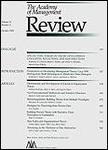-
作者:MCCOLLOM, M
-
作者:ALDRICH, HE; FIOL, CM
作者单位:University of North Carolina; University of North Carolina Chapel Hill; University of Colorado System; University of Colorado Denver
摘要:New organizations are always vulnerable to the liabilities of newness, but such pressures are especially severe when an industry is in its formative years. We focus on one set of constraints facing entrepreneurs in emerging industries-their relative lack of cognitive and sociopolitical legitimacy. We examine the strategies that founders can pursue, suggesting how their successful pursuit of legitimacy may evolve from innovative ventures to broader contexts, collectively reshaping industry and ...
-
作者:ROGERS, KS
-
作者:PERRY, EL; DAVISBLAKE, A; KULIK, CT
作者单位:University of Texas System; University of Texas Austin
摘要:In this article we integrate contextual and cognitive explanations for gender-based selection in the workplace; we also consider the implications of this integration for understanding gender segregation. We argue that decision makers' propensity to use applicant gender as a basis for hiring and promotion decisions varies systematically across organizational contexts. We explore specific ways in which organizational context influences decision makers' development and use of gender-associated sc...
-
作者:ABRAHAMSON, E; FOMBRUN, CJ
作者单位:New York University
摘要:Faced with turbulent national and international environments, entire U.S. industries-most notably steel and automobiles-have revealed a distinct propensity to overlook radically new types of competitors, cling to traditional technologies, and remain mired in similar, yet outdated, strategic postures. In this article, we ascribe the adaptive failures of entire industries not only to the microcultures of single organizations, but also to what we term interorganizational ''macrocultures''-relativ...
-
作者:LADO, AA; WILSON, MC
摘要:Drawing on the theoretical insights from the resource-based view of strategic management, this article explores the potential of human resource systems to facilitate or inhibit the development and utilization of organizational competencies. These competencies - managerial, input-based, transformational, and output-based-are presumed to yield sustained competitive advantage for a firm. The competency-based perspective, by focusing attention on the HR activities, functions, and processes that en...


